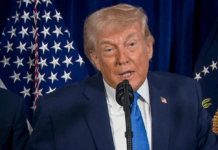In the waning hours of his presidency, Joe Biden made an unprecedented and controversial move: issuing preemptive pardons to individuals who have neither been charged nor convicted of any crimes.
Among those granted clemency were Dr. Anthony Fauci, retired Gen. Mark Milley, and key figures connected to the investigation of the January 6 Capitol attack. This sweeping decision underscores Biden’s concern for protecting public servants from potential political retaliation by Donald Trump, who is set to return to the White House amid warnings of retribution against his perceived adversaries.
Biden’s rationale for the pardons is steeped in a desire to shield those who he believes served the nation honorably, even as they faced intense criticism and threats. In a statement accompanying the announcement, Biden made it clear that these pardons are not an admission of wrongdoing.
Instead, he described them as a safeguard against politically motivated prosecutions, a growing concern as Trump assembles a Cabinet of allies who have pledged loyalty to his disputed election narratives. “These are exceptional circumstances,” Biden stated, pointing to the long-term damage reputations and livelihoods could suffer under politically charged investigations.
The pardons themselves carry immense symbolic and legal weight, particularly because they extend to individuals like Fauci and Milley, whose careers were shaped—and scarred—by their intersections with the Trump presidency. Fauci, a household name during the COVID-19 pandemic, became a lightning rod for criticism from conservatives who objected to mask mandates and other public health policies. Milley, the former chairman of the Joint Chiefs of Staff, openly criticized Trump’s behavior during and after January 6, referring to him as a threat to democracy.
Equally significant is Biden’s inclusion of the members and staff of the January 6 committee in the pardons. The committee, which worked tirelessly for 18 months to investigate Trump’s role in the Capitol riot, became a focal point of partisan battles. Figures like Liz Cheney, once a Republican stalwart, were vilified within their own party for their participation. Biden’s action serves as a counterweight to Trump’s promise to pardon individuals convicted for their roles in the insurrection, a move that reflects the widening gulf in how each administration interprets justice.
The legality and implications of Biden’s decision remain untested. By pardoning individuals who have not yet been charged, Biden is treading new ground, expanding the scope of presidential clemency to shield against hypothetical charges. This raises critical questions about how future presidents might wield this power, potentially offering carte blanche to allies or incentivizing loyalty through the promise of immunity.
Biden’s final act of clemency also dovetails with his broader record on pardons and commutations. His presidency saw a flurry of actions aimed at criminal justice reform, including the commutation of thousands of nonviolent drug offenders and the conversion of death row sentences to life imprisonment. This pattern of clemency reflects Biden’s attempt to leave a legacy rooted in mercy and systemic reform, though critics argue that his recent actions veer into uncharted and legally dubious territory.
The parallels to Gerald Ford’s pardon of Richard Nixon are striking. Ford, in the wake of the Watergate scandal, justified his controversial decision as a way to heal a divided nation. Biden, too, appears to be making a case for protecting democracy and safeguarding public servants from what he perceives as the corrosive effects of partisan vengeance. Yet, unlike Ford’s era, Biden’s pardons arrive in a hyper-polarized political climate, where acts of mercy are likely to deepen divisions rather than bridge them.
As Donald Trump prepares to retake office, Biden’s parting actions set the stage for a volatile political showdown. Trump has vowed to overturn many of Biden’s policies and pardon January 6 participants, further cementing his role as a champion of those who see themselves as victims of political persecution.
Meanwhile, Biden’s unprecedented pardons will almost certainly spark legal and constitutional debates for years to come, leaving a legacy that will be scrutinized long after his presidency fades into history. Whether these actions will be seen as bold statesmanship or overreach remains to be seen, but one thing is clear: Biden’s farewell has reshaped the boundaries of presidential power in ways no one can yet fully predict.







